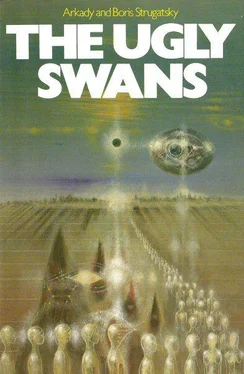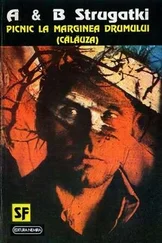Arkadi Strugatsky - The Ugly Swans
Здесь есть возможность читать онлайн «Arkadi Strugatsky - The Ugly Swans» весь текст электронной книги совершенно бесплатно (целиком полную версию без сокращений). В некоторых случаях можно слушать аудио, скачать через торрент в формате fb2 и присутствует краткое содержание. Жанр: Социально-психологическая фантастика, на английском языке. Описание произведения, (предисловие) а так же отзывы посетителей доступны на портале библиотеки ЛибКат.
- Название:The Ugly Swans
- Автор:
- Жанр:
- Год:неизвестен
- ISBN:нет данных
- Рейтинг книги:4 / 5. Голосов: 1
-
Избранное:Добавить в избранное
- Отзывы:
-
Ваша оценка:
- 80
- 1
- 2
- 3
- 4
- 5
The Ugly Swans: краткое содержание, описание и аннотация
Предлагаем к чтению аннотацию, описание, краткое содержание или предисловие (зависит от того, что написал сам автор книги «The Ugly Swans»). Если вы не нашли необходимую информацию о книге — напишите в комментариях, мы постараемся отыскать её.
The Ugly Swans — читать онлайн бесплатно полную книгу (весь текст) целиком
Ниже представлен текст книги, разбитый по страницам. Система сохранения места последней прочитанной страницы, позволяет с удобством читать онлайн бесплатно книгу «The Ugly Swans», без необходимости каждый раз заново искать на чём Вы остановились. Поставьте закладку, и сможете в любой момент перейти на страницу, на которой закончили чтение.
Интервал:
Закладка:
For a second Victor felt a twinge of regret. The remembrance of lost possibilities floated off and disappeared. But he only laughed, kicked the chair out of his way, and strode toward the exit.
Chapter XII
A year after the war Lieutenant B. is discharged because of wounds. They give him a Victoria medal and fork over a month's severance pay and a cardboard box full of presents from Mr. President: a bottle of liberated schnapps, two tins of Strasbourg pate, two loops of horse sausage, and a pair of liberated silk shorts to facilitate his transition to family life. Back in the capital, the lieutenant doesn't mope around. He's a good mechanic, and he knows that the university garage where he worked before he enlisted will take him back at a moment's notice. But he isn't in any hurry. He renews old friendships, makes new ones, and spends the remainder of his time getting drunk on the proceeds of the junk seized from the enemy as war reparations. At a party he meets a woman named Nora, a lot like Diana. A description of the party: scratched-up records from before the war, kitchen-distilled wood alcohol, American Spam, silk blouses on naked bodies, and carrots in every possible guise. The lieutenant, medals jingling, disperses with ease the small crowd of civilians busily engaged in filling Nora's plate with boiled carrots, and begins his siege. Nora acts strangely. On the one hand, she's clearly willing, but on the other, she lets him understand that associating with her is dangerous. But the ex lieutenant, fired up with kitchen-distilled alcohol, doesn't want to hear. They leave the party and go to Nora's. The postwar capital at night: occasional street lamps, the road pitted with holes, ruins everywhere. The new circus, not even finished, where six thousand prisoners of war are rotting under the guard of two invalids. In the narrow street, by now completely dark, someone's getting mugged. Nora lives in an old style three-story house. The staircase is covered with filth, one of the doors boasts a chalk inscription: "The German shepherd lives here." In the long corridor, filled with all sorts of trash, moldy figures recoil into the shadows. Nora, jangling innumerable keys, unlocks her door, a door covered with shining leather, preserved there by some miracle. In the foyer she gives him another warning, but B., figuring that it's nothing more than some criminal affair, answers only that he used to attack tanks on horseback. The apartment is spotless and comfortable, a relic from another era. There's a huge sofa. Nora looks at the lieutenant with something like pity. She leaves for a short time and returns, dressed to kill, with an opened bottle of cognac. It turns out that they have only a half hour at their disposal. In a half hour's time, the satisfied lieutenant leaves with the hope of a second meeting. At the end of the corridor, the two moldy figures from the shadows are lying in wait for him. Snickering unpleasantly, they bar his path and propose a little chat. Without wasting his breath, the lieutenant starts beating them up. His victory is unexpectedly easy. Knocked off their feet, weeping and giggling, the moldy figures explain B.'s position to him. The ex lieutenant had beaten up his own brothers. Now they are all brothers. Nora is more than a seductive woman, Nora is the queen of the capital bedbugs. "You're finished now, officer. We'll be meeting you in the 'Atakerama,' that's where we all meet, every night. Go home, and when you can't stand it any more, come to see us, we stay open till morning."
On the western outskirts of the city, in a rented house next to a chemical plant, lives the titular councilor B. with his large family. An intentionally detailed, intentionally dull description of the hero's surroundings: three rooms, a kitchen, a foyer, a worn-out wife, five greenish kids, and a hardy old mother-in-law, brought in from the country. The chemical plant stinks; day and night columns of colored smoke hang over it. The trees are dying from the poisonous fog, the grass is turning yellow, and the flies are mutating wildly. For the past few years, the titular councilor has waged a campaign to tame the plant: angry demands addressed to the administration, tearful petitions up the ranks, thunderous editorials in all the papers, fruitless attempts to organize a picket at the gates. But the plant still stands like a bastion. Poisoned sentries keel over on the opposite embankment; pets die; whole families leave their apartments and become vagrants; the newspapers print an obituary mourning the premature death of the plant director. The titular councilors's wife is dying; one by one his children fall victim to bronchial asthma. Then one evening, searching for firewood in the cellar, he comes across a mortar and a huge quantity of shells left over from the time of the Resistance. That very night, he drags it all up to the attic and opens a dormer window. The plant is stretched out before him, as in the palm of his hand. In the glare of searchlights, workers are scurrying, trolleys are moving, yellow and green clouds of poisonous vapors float in the air. "I'll kill you," whispers the titular councilor and opens fire. That day he stays home from work; the next day as well. He doesn't sleep and he doesn't eat, he squats under the dormer window and shoots. From time to time he takes breaks, to let the mortar cool down. He goes deaf from the firing and blind from the smoke. Sometimes he thinks that the chemical haze is breaking, and then he smiles, licks his lips, and whispers, 'Til kill you." Then, his strength gone, he falls asleep. When he wakes up, he sees that he's running out of shells; there are only three left. He fires the last round and leans out the window. The wide yard of the plant is riddled with craters. There are gaping holes in place of windows, and the sides of the huge gas tanks are covered with dents. The yard is crisscrossed by a complicated network of trenches, and workers are running along them in short bursts. Trolleys are moving faster than before, the drivers of autocars are protected by metal plates, and when the wind blows the poisonous vapor off to the side, a new white sign appears on the brick wall of the administration building: "Attention! During Shooting This Side Is Particularly Dangerous!"
Victor reread the last page, lit a cigarette, and looked at the sheet of paper in the typewriter. It contained all of a line and a half: "Leaving the editorial board, journalist B. wanted to take a taxi, but he thought the better of it and headed for the subway." Victor knew precisely what was going to happen to journalist B. But he couldn't write any more. His watch showed a quarter to three. He got up and threw open the window. It was pitch black outside, and the rain glistened darkly. Standing at the window, he finished his cigarette, cast the butt into the wet night, and called the desk clerk. An unfamiliar voice answered. Victor asked what day of the week it was. After a pause, the unfamiliar voice informed him that it was the early hours of Saturday. Victor blinked, put down the receiver, and with a decisive gesture removed the paper from his typewriter. Enough is enough. Two days and two nights without stretching, without talking to anyone, without plugging in the phone or responding to knocks at the door. Without Diana, without booze, and, it seemed, without food either, only tumbling into bed from time to time to see the Queen of the Bedbugs in his dreams, to watch her sitting on the door frame and twitching her black mustache. Enough. Journalist B. will remain on the platform until the train comes with the sign "No Passengers." Nothing's going to happen to him. "And in the meantime we'll have a bite to eat, we certainly earned it."
Victor put the typewriter away. He hid the manuscript in his desk and rummaged in the empty bar. Then he chewed a stale roll with jam, bitterly mourning the fact that yesterday he'd poured a half bottle of brandy down the sink to avoid temptation. But he was glad that the series "Backstage in the Big City" was at least started, and not badly, either. In fact, it was a fine start, satisfactory in all respects. Although he would probably have to rewrite the whole thing.
Читать дальшеИнтервал:
Закладка:
Похожие книги на «The Ugly Swans»
Представляем Вашему вниманию похожие книги на «The Ugly Swans» списком для выбора. Мы отобрали схожую по названию и смыслу литературу в надежде предоставить читателям больше вариантов отыскать новые, интересные, ещё непрочитанные произведения.
Обсуждение, отзывы о книге «The Ugly Swans» и просто собственные мнения читателей. Оставьте ваши комментарии, напишите, что Вы думаете о произведении, его смысле или главных героях. Укажите что конкретно понравилось, а что нет, и почему Вы так считаете.











